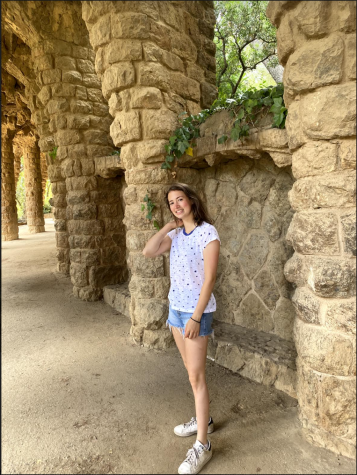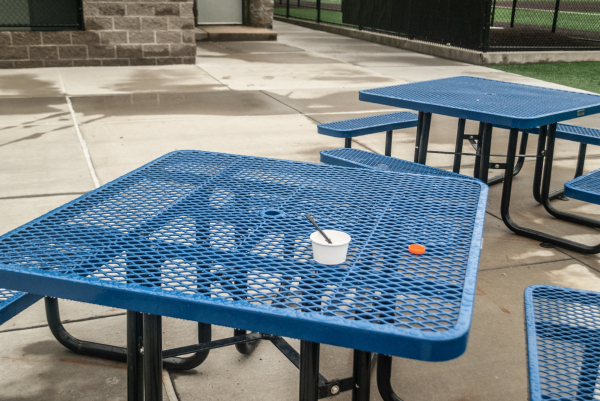What Is “The” Poly Man?
A look inside the Male Allies affinity space
This story has been updated to clarify that the majority of, but not all, members of the Male Allies affinity group are white.
Editor’s note (September 17, 2024): This article has been updated to remove the name of the female-identifying junior who attended the Male Allies group. The student, now an alum, requested the removal of her name; given that the integrity of the story would not be lost without her name and the article was published years before, the editors decided to grant the request.
Once in a seven-day cycle, male-identifying students gather to talk about their emotions, relationships, identities, and roles in a patriarchal society. As the community contends with the struggles of minorities or otherwise those subjugated to disproportionate treatment, students in the Male Allies affinity group have too been grappling with their identities, struggles, and the role they play in the fabric of our school.
A male affinity group was first introduced to Poly in 2019 by history teacher David Reid and psychology teacher Ronald Sarcos. Despite the effort, Reid said, “There was no student interest, so the group never got off the ground.”
This year, Director of Student Life Jared Winston founded the Male Allies group, in which students learn about themselves and how other genders experience the world during DEIB block; there is a fair turnout. “Male Allies has around 20 members from all four grades, and MS has four separate grade-level boys’ groups,” said Winston. These groups are all new to the 2021-2022 school year.
A common topic of conversation surrounds what many students consider the problem of toxic masculinity at Poly. “A lot of boys here, as well as other schools, feel pigeonholed—that they have to conform to a certain stereotypical masculinity that erases or ignores who they are. Boys can often feel lost in a society where to be male is to be some cultural masculine ideal,” said Winston.
The group is not only extended to male peers, however. A female-identifying junior, who preferred to remain unnamed, curious to see what was going on in the group, went to what she thought was the first and last meeting she would attend. She has been coming back every DEIB since.
As one of the few members of Male Allies willing to interview with the Polygon, the junior described what many male students express in meetings. “A lot of guys have spoken to the feeling that they need to ‘be a man’ in a group…[that] it’s hard to express your emotions without compromising your masculinity. [There’s] this belief that being vulnerable makes you weak,” said the junior.
“The cultural constraints on masculinity can be obvious in some cases, but are mostly more subtle and interwoven with social interaction making them difficult to isolate and act on without disrupting other social dynamics,” added science teacher Joseph Fallica, who advises the group alongside Winston.
The constraints Fallica speaks of are entwined in the struggle and fear to advocate for themselves. “From my experience in the group, men struggle with being able to speak up when faced in certain situations and they feel they have to be the stereotype of a man, not who they actually are,” said junior Justin Durso.
In a survey sent to the Male Allies group, students were asked to respond to what it’s like to be a boy at Poly. One wrote, “Poly has done a good job trying to educate us on how to be good citizens of the world, but the administration has for too long ignored the very real problems in the school. Hearing the negative experiences of girls at this school pisses me off, because most boys aren’t like that.” The student continued: “Boys don’t just exhibit creepy behaviors to girls, they do it to other boys too.”
To acknowledge the problems through discussion is the first step to addressing the problem, Fallica explained. He said, “[The group tries] to bridge what’s happening in the country with what’s happening at Poly. We have read articles, analyzed media, and explored advocacy materials.”
Some students have questioned the necessity of the group, suggesting that men already have the freedom and space the group offers in a patriarchal society.
“I think it evades the purpose of the club to have only one primary identity group meet to discuss the power systems that largely benefit them,” said senior Emily Melcer.
“I also worry that having separate male and women affinity groups further divides us; however, I recognize that having comfortable spaces to talk is also important,” said senior Grace Taylor.
Winston, however, emphasizes that to make effective change, those of all genders have a role in eliminating any form of bias or prejudice in the community. “Male Allies discuss male-identifying issues, as well as more cultural problems facing peers of other genders…If we can agree that navigating society as males is often frustrating and stifling, we can more meaningfully recognize others’ struggles and begin to support them more seriously,” said Winston.
Another male student on the survey wrote, “Although it’s easy to shrug off things that bother you, I think most of the boys would agree that a lot of us aren’t comfortable being vulnerable in social situations, which is why it’s important to have a space for exactly that.”
Furthermore, the diversity of the group—the majority of members are white—has some, including Melcer, uneasy and ambivalent. “It seems like there are many other spaces for people who could potentially attend the male affinity space, and it ends up leaving only the white, cisgender men, which may pose possible problems to the group’s integrity,” said Melcer.
Winston acknowledges the problem, but emphasizes the inherent logistical conflicts during the DEIB block. “The identified demographic disparity seems to be less about the students who choose to be Male Allies and more about the structure of DEIB (Asia Society, Umoja, and Unidad run during DEIB A-Block, too). That students of color at a PWI might elect to be in a space that honors their race or ethnicity at a historically male institution does not seem anomalous,” Winston wrote in an email to the Polygon.
“That said, would Male Allies benefit from a more diverse range of perspectives? Absolutely! A dialogue among current affinity and alliance groups would open the door for really valuable insights, and this group is always open to collaboration,” he continued.
Going forward, the group hopes to collaborate with Women’s Affinity and work to address female discomfort at Poly, a major topic of discussion this year surrounding students’ experiences of sexual harassment and assault.
“The Male Allies group has discussed how female-identifying peers are treated within the Poly community, and the group shares a common understanding that this culture needs to be addressed. Female discomfort is not a female issue—we understand it to be a male issue. I am working with Dr. [Virginia] Dillon, [a] Women’s Affinity faculty advisor, to find a time for Women’s Affinity student leadership to meet with Male Allies for an allied dialogue around how male-identifying students can best support their female-identifying peers,” said Winston.
Despite skepticism, the Male Allies affinity group is working hard to improve the daily lives of male-identifying students at Poly and the greater community, Winston summarized. He said, “The goal is to help all students—no matter their identity—recognize the various strategies available to them [at] any given moment where a community member is being harmed or made to feel uncomfortable.”

Emma Spring '22 is currently an Editor-in-Chief of the Polygon. She began writing as a staff writer during her freshman year, became the Sports Editor...


























